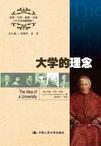大学的理念
2012-10
中国人民大学出版社
[英] 约翰•亨利•纽曼
460
郭英剑
无
《世界·大师·原典·文库:大学的理念(中文导读插图版)》是一部阐释教育哲学思想的演讲集,更是一部语言优美且言简意赅、思想深刻又发人深省、影响深远而令人难忘的经典演讲录。 《世界·大师·原典·文库:大学的理念(中文导读插图版)》几乎涵盖了纽曼所有有关大学的哲学思考,其中提出了很多在当时的欧洲高等教育中所面临的重大问题,比如宗教在大学中的地位、大学中的道德观、人文教育与职业教育的冲突、学术社区的特征、文学的文化作用以及宗教与科学的关系等等。但就历史背景而言,纽曼及其大学教育观的出现不是偶然的。
约翰-亨利·纽曼(1801-1890),19世纪英国著名的教育家、文学家、语言学家和神学家。纽曼出生于一个温和的新教圣公会家庭。1817年6月进入牛津大学三一学院,1820年取得学士学位,并在两年后成为牛津大学奥列尔学院的特别研究员。纽曼在1824年被授予英国国教会的圣职,此间出版10卷布道集。纽曼学识渊博,著述丰富,《大学的理念》是他最重要也是最有影响力的代表作。
PrefaceUNIVERSITY TEACHINDiscourse Ⅰ. IntroductoryDiscourse Ⅱ. Theology-A Branch of KnowledgeDiscourse Ⅲ. Bearing of Theology on Other Branches of KnowledgeDiscourse Ⅳ. Bearing of Other Branches of Knowledge on TheologyDiscourse Ⅴ. Knowledge Its Own EndDiscourse Ⅵ. Knowledge Viewed in Relation to LearningDiscourse Ⅶ. Knowledge Viewed in Relation to Professional SkillDiscourse Ⅷ. Knowledge Viewed in Relation to ReligionDiscourse Ⅸ. Duties of the Church Towards KnowledgeUNIVERSITY SUBJECTS-DISCUSSED IN OCCASIONAL LECTURES AND ESSAYSIntroductory Letter Lecture Ⅰ. Christianity and Letters-A Lecture in the School of Philosophy and LettersLecture Ⅱ. Literature-A Lecture in the School of Philosophy and LettersLecture Ⅲ. English Carholic LiteratureLecture VI. Elementary StaudiesLecture Ⅳ. Christianity and Physical Science-A Lecture in the School of MedicineLecture Ⅴ. A Form of Infidelity of the DayLecture Ⅵ. University PreachingLecture Ⅶ. Christianity and Physical Science-A Lecture in the School of MedicineLecture Ⅷ. Christianity and Scientific Investigation-A Lecture Written for the School of ScienceLecture Ⅸ. Discipline of Mind-An Addresstothe Evening ClassesLecture Ⅹ. Christianity and Medical Science-An Address to the Students of Medicine Note on Page 420
"If these studies," he continues, "be such as give a direct play andexercise to the faculty of the judgment, then they are the true basis ofeducation for the active and inventive powers, whether destined fora profession or any other use. Miscellaneous as the assemblage mayappear, of history, eloquence, poetry, ethics, etc., blended together,they will all conspire in an union of effect. They are necessarymutually to explain and interpret each other. The knowledge derivedfrom them all will amalgamate, and the habits of a mind versedand practised in them by turns will join to produce a richer vein ofthought and of more general and practical application than could beobtained of any single one, as the fusion of the metals into Corinthianbrass gave the artist his most ductile and perfect material. Might weventure to imitate an author (whom indeed it is much safer to takeas an authority than to attempt to copy), Lord Bacon, in some of hisconcise illustrations of the comparative utility of the different studies,we should say that history would give fulness, moral philosophystrength, and poetry elevation to the understanding. Such in reality isthe natural force and tendency of the studies; but there are few mindssusceptible enough to derive from them any sort of virtue adequate tothose high expressions. We must be contented therefore to lower ourpanegyric to this, that a person cannot avoid receivng some infusionand tincture, at least, of those several qualities, from that course ofdiversified reading. One thing is unquestionable, that the elements ofgeneral reason are not to be found fully and truly expressed in any onekind of study; and that he who would wish to know her idiom, mustread it in many books. "If different studies are useful for aiding, they are still moreuseful for correcting each other; for as they have their particularmerits severally, so they have their defects, and the most extensiveacquaintance with one can produce only an intellect either too flashyor too jejune, or infected with some other fault of confined reading.History, for example, shows things as they are, that is, the morals andinterests of men disfigured and perverted by all their imperfections ofpassion, folly, and ambition; philosophy strips the picture too much;poetry adorns it too much; the concentrated lights of the three correctthe false peculiar colouring of each, and show us the truth. The rightmode of thinking upon it is to be had from them taken all together,as every one must know who has seen their united contributionsof thought and feeling expressed in the masculine sentiment of ourimmortal statesman, Mr. Burke, whose eloquence is inferior only tohis more admirable wisdom, If any mind improved like his, is to beour instructor, we must go to the fountain head of things as he did,and study not his works but his method; by the one we may becomefeeble imitators, by the other arrive at some ability of our own. But,as all biography assures us, he, and every other able thinker, has beenformed, not by a parsimonious admeasurement of studies to some definite future object (which is Mr. Edgeworth's maxim), but by takinga wide and liberal compass, and thinking a great deal on many subjectswith no better end in view than because the exercise was one which made them more rational and intelligent beings." ……
《大学的理念》是近代高等教育史上第一本论述大学理念的专著,在出版一百多年后的今天,仍对世界高等教育的发展有着积极的影响。美国著名高等教育家布鲁贝克指出:“在高等教育哲学领域的所有著作中,影响最为持久的当推红衣主教纽曼的《大学的理念》。” “我要说,如果我们要改进心智,首先必须上升到一定的高度。在同一水平上,我们不可能获得真正的知识。我们必须概括、总结方法,我们必须掌握种种原则,并借助这些把我们所获得的东西进行分类,使之成形。” ——约翰·亨利·纽曼

无